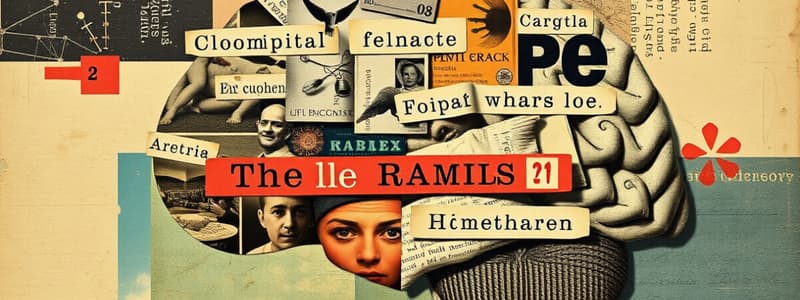Podcast
Questions and Answers
What is memory?
What is memory?
The persistence of learning over time through the storage and retrieval of information.
What is a flashbulb memory?
What is a flashbulb memory?
A clear memory of an emotionally significant moment or event.
What is encoding?
What is encoding?
The processing of information into the memory system.
What is the serial position effect?
What is the serial position effect?
What is automatic processing?
What is automatic processing?
What is effortful processing?
What is effortful processing?
What is the spacing effect?
What is the spacing effect?
Who is Hermann Ebbinghaus?
Who is Hermann Ebbinghaus?
What is focused attention?
What is focused attention?
What is divided attention?
What is divided attention?
What is the next-in-line effect?
What is the next-in-line effect?
What is the recency effect?
What is the recency effect?
What is the primacy effect?
What is the primacy effect?
What is the von Restorff effect?
What is the von Restorff effect?
What is the self-reference effect?
What is the self-reference effect?
What is rosy retrospection?
What is rosy retrospection?
What is visual encoding?
What is visual encoding?
What is acoustic encoding?
What is acoustic encoding?
What is semantic encoding?
What is semantic encoding?
What are mnemonics?
What are mnemonics?
What is storage in memory?
What is storage in memory?
What is retrieval in memory?
What is retrieval in memory?
Flashcards are hidden until you start studying
Study Notes
Memory Concepts in Psychology
- Memory refers to the ability to persistently learn and to store and retrieve information over time.
- Alzheimer's disease can severely impair memory functions.
Flashbulb Memory
- Flashbulb memories are vivid recollections of emotionally charged events, often retained over time, such as graduation.
Encoding Processes
- Encoding is the conversion of information into a form suitable for storage in memory.
- Examples include extracting meaning from experiences, like remembering a coach's pep talk.
Recall Effects
- Serial Position Effect describes the tendency to best remember the first and last items in a sequence.
- Recency Effect refers to better recall of items presented at the end of a list.
- Primacy Effect indicates improved memory for information presented first.
- Next-in-Line Effect highlights reduced recall for individuals immediately before or after speaking in a group.
Attention in Memory
- Focused Attention involves concentrating on a singular aspect while ignoring distractions.
- Divided Attention occurs when managing two tasks at once, such as driving while on a call.
Processing Types
- Automatic Processing entails unconscious encoding of incidental information, like recalling lunch details without effort.
- Effortful Processing requires deliberate attention and memory effort, often seen in studying.
- Spacing Effect suggests distributed practice yields better long-term retention compared to cram sessions.
Early Memory Research
- Hermann Ebbinghaus pioneered research in verbal memory and introduced the concept of the learning curve.
Encoding Techniques
- Visual Encoding captures images and creates mental pictures from descriptions.
- Acoustic Encoding processes sounds, especially spoken words.
- Semantic Encoding focuses on understanding the meaning of information.
Memory Aids
- Mnemonics are techniques that enhance memory retention through vivid imagery or organized formats (e.g., PEMDAS for order of operations).
Memory Retention and Retrieval
- Storage is the maintenance of encoded information over time, a key aspect of memory systems.
- Retrieval is the process of accessing stored information from memory, crucial for recall tasks.
Other Memory Biases
- von Restorff Effect explains the propensity to remember distinctive or unusual items.
- Self Reference Effect indicates that people remember information better when they can relate personally to it.
- Rosy Retrospection describes the tendency to evaluate past experiences more positively than how they felt at the time.
Studying That Suits You
Use AI to generate personalized quizzes and flashcards to suit your learning preferences.





